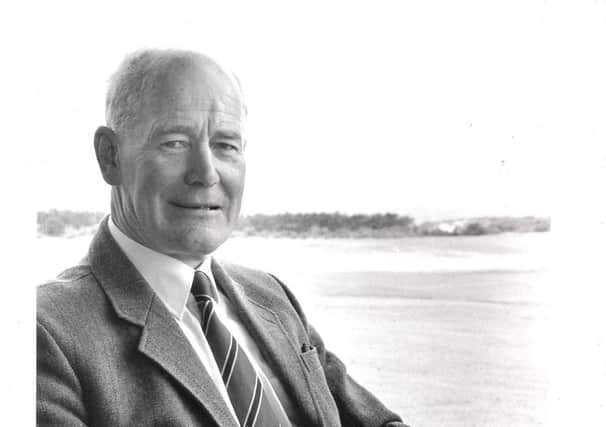Gentleman of the links


Cramond Kirk was packed on 20 December last year to celebrate the life of Douglas Foulis. The Reverend Norman Drummond, formerly the headmaster of Loretto School, said in his welcome: “Douglas was a gentleman.”
George Smillie, the official Starter of the Honourable Company of Edinburgh Golfers at Muirfield, learning of Past Captain Foulis’ death, said: “He was a gentleman.”
Advertisement
Hide AdAdvertisement
Hide AdHarry Knox, an architect who served as a sergeant-major in the Territorial Army, in the 278 Royal Regiment of Artillery, when Douglas was Commanding Officer, said: “Colonel Foulis was a gentleman”.
The Leith Rules of Golf committee, of which he was President, recording his death on its website ended with the words: “Farewell to our gentle Gentleman.”
What did they all mean? The word has changed its meaning over the years. At one time it meant ‘well born’. That was not at all what they had in mind. Yet, in a sense, Douglas was exactly that. His family, in post-Enlightenment Edinburgh, a centre of great authors, literature and publishing, had for generations played an important role in the book trade.
But what all the above had in mind was that he was well-mannered, always interested in others and widely respected. That, plus an ever-present sense of fun and an ability to find pleasure in all whom he met and everything that he did, meant that he had countless friends in all walks of life in, what was for him, a very happy, busy 90years.
Educated at Loretto, where he became a governor, he left in the last year of the Second World War to be commissioned in the Royal Regiment of Artillery and was posted to India. On demobilisation he continued to serve in the Territorial Army, joining the 278 Regiment in Edinburgh, eventually becoming its Commanding Officer with the rank of Lieutenant-Colonel. He was awarded the Territorial Decoration and the honorary rank of Brevet Colonel. He was also a member of The Royal Company of Archers.
It was natural that he should join Hunter and Foulis, his father’s company, and in time became its chief executive and chairman.
Douglas was a competent golfer with a long, easy, classic swing. He played for Loretto in the Halford Hewit Public Schools Championship. It is perhaps fair to say that, if success at the higher levels of golf is a blend of skill and a powerful desire to win, Douglas had more of the former than the latter.
In 1992, he was appointed Captain of The Honourable Company of Edinburgh Golfers and, most unusually, was asked to stay on for a third year in order that he would be the Captain during the 250th anniversary of the founding of the club in Leith in 1744.
Advertisement
Hide AdAdvertisement
Hide AdHe was an outstanding success, being the perfect host to the many clubs from home and abroad who joined the celebrations to mark this important event in the history of golf.
He cherished that history and was the President of the Leith Rules of Golf Committee. The first rules were written in Leith in 1744 on one page. Today there are many pages and volumes explaining how they have been, and should be, interpreted.
Douglas was conscious of change not only in golf but, as he well knew, in the book trade. As his son Patrick said in one of two excellent tributes at the service, he understood and accepted the need to move with the times.
The Monks of St Giles is a dining club which has nothing to do with the Cathedral and less with monasteries – but has a lot to do with fun. Members compose and recite verses at their regular suppers. Douglas’ contributions were always brief, full of fun and with a keen sense of the ridiculous. At the time of his death he was the senior active monk, the Doyen.
He loved to sing and did so with The Muirfield Minstrels. They performed at birthdays and anniversaries with the late Michael Kennedy providing a tap-dancing interlude between songs of the Twenties and Thirties.
Shortly before his final illness, at home, a little unsteady on his feet but otherwise in good heart, he suddenly sang one of his favourites, The Lady of Laguna. With a raised eyebrow and eyes wide, as if to emphasise the importance of the words, he sang the chorus: “She says she loves me, she says she loves me, because she says so.”
We are not to know what he was thinking; but his friends know that he had the happiest of marriages to Yves whom he married in 2003. He had previously married Jane Thomson with whom he had Lucy and Patrick and Alice.
SIR CHARLES FRASER